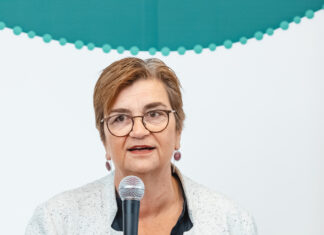Hamish Heard
Geelong is set to become Australia’s leading regional centre for cancer detection services with the arrival of world-leading medical imaging technology.
Federal Health Minister Tony Abbott told the Independent he expected to announce funding for a Positron Emission Tomography (PET) machine at Geelong’s St John of God Hospital within weeks.
The technology, which allows for earlier detection and improved treatment of cancer, has been found to boost cancer survival rates.
The hospital and its radiology services provider, Lake Imaging, plan to spend more than $4 million bringing the technology to Geelong.
They have applied for Federal Government funding to help house the project.
Mr Abbott spoke in support of the project during a visit to Geelong this week when he launched regional Australia’s first dual-source CT scanner at Lake Imaging’s Ryrie Street clinic.
He said Member for Corangamite Stewart McArthur had been lobbying Canberra vigorously for money to help bring a PET scanner for the city.
“I am very conscious of the need to extend regional Victorians’ access to PET scanning services,” Mr Abbott said.
“We have some regional programs that sometimes allow us to meet these funding requests and I hope I might be in a position to make an announcement in the next couple of weeks.”
St John of God Hospital chief Stephen Roberts said the PET equipment would combine with the dual-source CT scanner to make the city regional Australia’s undisputed leader in health care.
“It’s fair to say it will position Geelong as the pre-eminent region for health care in Australia,” he said.
“The outcome of that is we can enhance early diagnosis, recovery and the quality of life of people requiring treatment.”
The dual-source CT scanner provides faster and more accurate images than conventional equipment, allowing doctors to better diagnose problems ranging from broken bones and kidney stones through to aneurysms and heart conditions.
Lake Imaging managing partner Craig Lightfoot said the multi-million-dollar equipment would prevent patients from having to travel to Melbourne for tests and waiting weeks for results.
“In terms of radiological services, Geelong won’t be on par with other regional centres, we’ll be miles ahead,” he said.
“It will enable us to attract highly qualified health professionals to Geelong and focus the attention of some of the world’s leading medical researchers on Geelong.”
City to lead in cancer service
Digital Edition
Subscribe
Get an all ACCESS PASS to the News and your Digital Edition with an online subscription
Good Friday Appeal provides regional funding boost
The Barwon South West will share in $3 million in funding from the Good Friday Appeal and The Royal Children’s Hospital (RCH) this year.
Victorian...








